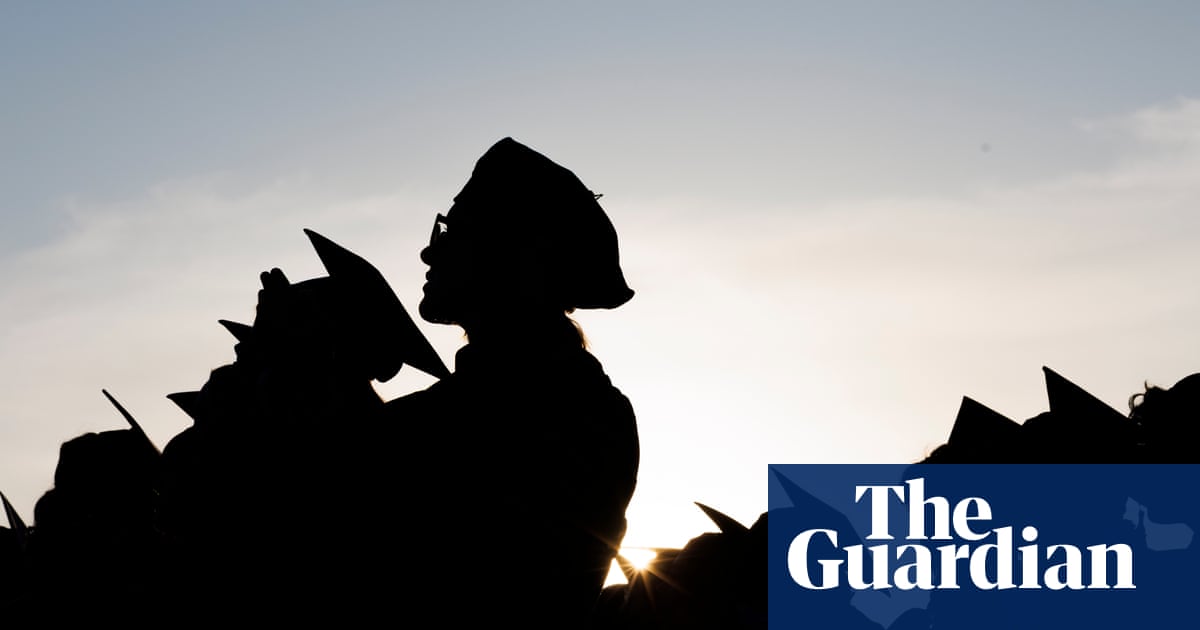Christian nationalists in the US are positioning Charlie Kirk as a martyr for their movement, one that has grown in popularity and whose rise was intertwined with Kirk’s own political ascent.
After Kirk’s killing, his widow, Erika Kirk, wrote on social media that the “world is evil”, but God “so good.” The “sound of this widow weeping [echoes] throughout this world like a battle cry,” she said. “They have no idea what they just ignited within this wife.”
While Erika Kirk’s private sorrow is no doubt very real, her public remarks are telling, said Jeff Sharlet, the author of several books on Christian nationalism and the far right. “That’s holy war, that’s accelerationism, and it’s incredibly powerful,” he said, particularly in the emotional context of a grieving widow.
Sharlet noted that although Kirk was best known for his non-religious political organizing, conservative eulogizing has overwhelmingly emphasized that he was a man of faith. Some people have gone further, and characterized Kirk’s death as martyrdom for conservative Christian values.
“We know that the blood of the martyrs is the seed of the church,” Sean Feucht, a pastor who worked with Kirk and is known for his Christian nationalist views, said in an emotional video on social media. “The devil is not gonna win. The forces want us to be silent; they want us to shut up … We need to be more bold.”
Matt Tuggle, a megachurch pastor, posted a video of Kirk’s death with the caption: “If your pastor isn’t telling you the left believes a evil demonic belief system you are in the wrong church!”
The rise of Trump-era Christian nationalism
Kirk’s meteoric career as a pundit and far-right activist was in some ways a microcosm of the rise of Trump-era Christian nationalism. Kirk started as a publicly secular young Republican in the Alex P Keaton mold but came to embrace a strident Christian culture war, speaking of a “spiritual battle … coming to the West” that would pit “Christendom” and “the American way of life” against leftism and Islam.
Similarly, Turning Point USA, which Kirk founded in 2012, started as a pro-free market organization downstream of the late-2000s Tea Party movement against “big government”, but by the time of his death he had leaned into ideas associated with the Christian right. The organization may have done so because it spotted an opportunity.
Shortly before Donald Trump won his first election to the presidency, the mainstream Christian right was demoralized and open to more extreme and anti-democratic ideas, noted Matthew D Taylor, a scholar of contemporary Christianity and the author of The Violent Take It by Force: The Christian Movement that is Threatening Our Democracy.

Christian nationalism is the belief that the US is and should be an explicitly Christian nation. Experts tend to view the ideology as existing on a continuum that ranges from relatively mainstream cultural conservatism to extreme religious supremacy. Defining it is difficult because Christian nationalism is less an organized movement than a tendency or way of thinking, Taylor and others said.
For many years, the Christian right was dominated by groups such as the Moral Majority, which emphasized the idea of organizing Christian voters to democratically achieve conservative outcomes, as well as efforts to train and elevate conservative jurists to influence the federal judiciary.
Yet two electoral victories by Barack Obama and the US supreme court’s 2015 Obergefell ruling, which legalized same-sex marriage across the country, left Christian conservatives feeling that all their efforts were for nothing. Because of changing demographics and the ongoing secularization of society, the number of Americans who identified as Christian was also dropping – meaning that majoritarian democracy was no longer a reliable political tool for the Christian right.
“The early summer of 2015 … was a low point for them,” Taylor said. “There was this sense of, ‘What we’re doing is not working. We need someone strong. We need a fighter.’ And it just so happened that Trump kind of appeared on the scene at that moment, and I think that was, in part, the rocket fuel behind his appeal to evangelicals; he said: ‘I will speak for you. I will defend you. I will give you more power.’”
Despite occasional misgivings, the Christian right soon enthusiastically aligned with Trump. But when he came into office, Trump did something new: he surrounded himself with Christian advisers from outside the traditional leadership of the Christian right. Led by Trump’s longtime adviser, the pastor Paula White-Cain, his new consiglieres tended to be megachurch preachers who had big followings in their spheres of influence but were viewed as B-list – or C-list, or D-list – figures by the conservative Christian political establishment.
White-Cain “was an independent, charismatic televangelist and megachurch pastor and was on her third marriage, a female preacher, and preached the prosperity gospel,” Taylor said – in other words, someone with many markers “that people in the conventional evangelical world would have either labeled heresy or just low-brow”.
‘He drew the church into Maga’
After this changing of the guard, there were “some pretty wild and extreme theologies” that gained access to the Trump administration and conservative centers of power, Taylor said, including a far-right movement, popular in some charismatic and Pentecostal circles, that is sometimes called the New Apostolic Reformation (NAR). The NAR advocates for modern-day apostles and prophets to lead conservative Christians in turning the US into a dominion of Christ on Earth.
The NAR leaders who “attached themselves to Trump and the Maga movement very early on,” Taylor said, “had a vision of social change, of societal conquest, that was far more aggressive than some of the old frameworks of the religious right.” That vision was exciting and politically potent to people including Kirk, who adopted theories and language associated with the NAR.
The NAR has a distinctly minoritarian and anti-democratic valence. Rather than a Christian public lobbying to make government and society reflect its values, NAR ideas argue for Christians to take positions of power and push their values from the top down. A key NAR concept is something called the “seven mountains mandate” – the idea that “spiritual war” will not succeed until Christians have scaled and conquered seven summits of influence in public life, commonly identified as religion, the government, the media, education, culture, entertainment, and business.
“The seven mountains, as an ideology, is deeply ambivalent about democracy,” Taylor said. “If democracy works, and gets you to positions of power, great, but if not, well, God’s will is still for Christians to take over the seven mountains, and they need to do it by whatever means they can.”
The concept of the seven mountains has existed since the 1970s but was popularized in the 2000s, according to Matthew Boedy, a professor of rhetoric at the University of North Georgia and the author of the forthcoming book The Seven Mountains Mandate: Exposing the Dangerous Plan to Christianize America and Destroy Democracy.
Kirk had been an evangelical Christian since childhood but earlier in his career expressed reluctance at politicizing his religious views. That changed during the peak of the early pandemic, when Kirk made the acquaintance of several charismatic megachurch pastors protesting church lockdowns. He began to traffic in ideas influenced by the NAR, including the seven-mountain mandate. Turning Point USA also began to forge partnerships with churches.

Kirk’s own evolution was striking: he went from saying, in 2018, that it was important that Christians respect the separation of church and state to denying that any such separation existed in the US constitution.
Kirk never used the exact phrase “seven-mountain mandate”, Boedy said, but at a Conservative Political Action Conference (CPAC) in 2020 Kirk praised Trump by saying: “Finally, we have a president who understands the seven mountains of cultural influence,” which was one of the most prominent mentions of the concept in the conservative mainstream. Kirk also attended conferences organized around the theme of the seven-mountain mandate.
“‘Seven mountains’ is a kind of weird, wonky theology,” Sharlet said; Kirk “normalizes it and mainstreams it and smooths it out”.
Kirk understood “the political and religious baggage that comes with the idea of Christian dominionism, of theocracy,” Boedy believes, and was trying to gently popularize Christian nationalist ideas while avoiding their more negative connotations.
The “Appeal to Heaven” flags seen at the January 6 riot and elsewhere are often an NAR symbol. Mike Johnson, the speaker of the US House of Representatives, has ties to NAR circles and flies an Appeal to Heaven flag at his congressional office. Ché Ahn, the Republican candidate for governor of California and a charismatic preacher, is an adherent of NAR and “seven-mountain” ideas.
Kirk was an activist more interested in uniting conservative Christians than representing any one faction or denomination. Yet the NAR might be understood as one of three main currents of hardline contemporary Christian nationalism in the US, Taylor said. The other two streams are radical traditionalist Catholics and a certain aggressively “masculine” reformed Protestantism embodied in Pete Hegseth, the US secretary of defense.
In contrast to the Catholic and reformed Protestant camps, which tend to be very white and male in their leadership and intellectually influential but not widely popular, the NAR has roots in a rapidly growing international charismatic movement that is multi-ethnic, open to women in leadership, and viscerally exciting to rank-and-file churchgoers.
Yet the symbolism and rhetoric of Christian nationalism are also attractive to broad swathes of conservative Americans, including those who are not actively religious, Sharlet noted. Although the Christian nationalism of popular imagination is a strict, Handmaid’s Tale-style piety, he said he often encounters Maga conservatives who are intensely dedicated to Christian nationalist ideas despite the fact that they do not attend church.
“It wasn’t so much that [Kirk] joined the church as he drew the church into Maga,” Sharlet feels. “And I think he made a kind of influencer-lifestyle Christian nationalism that was appealing, that you could adopt [as a] kind of performance without having to change your life too much.”
“No civilization has ever collapsed because it prays too much,” Kirk declared not long before he died. But he also gestured at a broader and more potent theme: that “a civilization that abandons God will deteriorate and ultimately collapse from the inside out.”

 German (DE)
German (DE)  English (US)
English (US)  Spanish (ES)
Spanish (ES)  French (FR)
French (FR)  Hindi (IN)
Hindi (IN)  Italian (IT)
Italian (IT)  Russian (RU)
Russian (RU)  3 hours ago
3 hours ago
























Comments